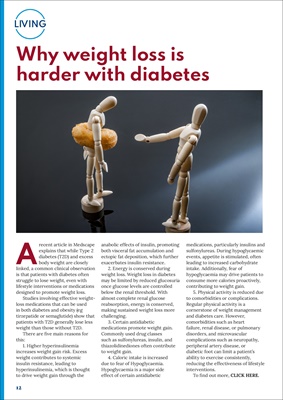
12
LIVING
Why weight loss is
harder with diabetes
Arecent article in Medscape
explains that while Type 2
diabetes (T2D) and excess
body weight are closely
linked, a common clinical observation
is that patients with diabetes often
struggle to lose weight, even with
lifestyle interventions or medications
designed to promote weight loss.
Studies involving effective weightloss medications
that can be used
in both diabetes and obesity (eg
tirzepatide or semaglutide) show that
patients with T2D generally lose less
weight than those without T2D.
There are five main reasons for
this:
1. Higher hyperinsulinemia
increases weight gain risk. Excess
weight contributes to systemic
insulin resistance, leading to
hyperinsulinemia, which is thought
to drive weight gain through the
anabolic effects of insulin, promoting
both visceral fat accumulation and
ectopic fat deposition, which further
exacerbates insulin resistance.
2. Energy is conserved during
weight loss. Weight loss in diabetes
may be limited by reduced glucosuria
once glucose levels are controlled
below the renal threshold. With
almost complete renal glucose
reabsorption, energy is conserved,
making sustained weight loss more
challenging.
3. Certain antidiabetic
medications promote weight gain.
Commonly used drug classes
such as sulfonylureas, insulin, and
thiazolidinediones often contribute
to weight gain.
4. Caloric intake is increased
due to fear of Hypoglycaemia.
Hypoglycaemia is a major side
effect of certain antidiabetic
medications, particularly insulins and
sulfonylureas. During hypoglycaemic
events, appetite is stimulated, often
leading to increased carbohydrate
intake. Additionally, fear of
hypoglycaemia may drive patients to
consume more calories proactively,
contributing to weight gain.
5. Physical activity is reduced due
to comorbidities or complications.
Regular physical activity is a
cornerstone of weight management
and diabetes care. However,
comorbidities such as heart
failure, renal disease, or pulmonary
disorders, and microvascular
complications such as neuropathy,
peripheral artery disease, or
diabetic foot can limit a patient's
ability to exercise consistently,
reducing the effectiveness of lifestyle
interventions.
To find out more, CLICK HERE.